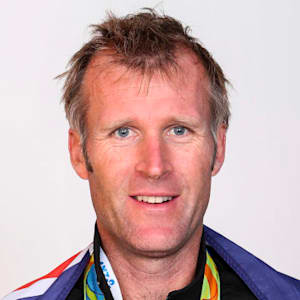Mahe DRYSDALE
Biografie
A five-time world champion and Olympic gold medallist in 2012, single sculls specialist Mahé Drysdale went on to retain his Olympic crown at the age of 37, on the Rio 2016 rowing lake. And he has no intention of stopping there!
Inspired by Waddell
Mahé Drysdale (NZL), named after the largest island of the Seychelles, took up rowing during the 1990s, excelling at canoe polo to such a degree that he represented New Zealand at various youth levels. He then took a break from competing to pursue his studies, but was lured back to the water after witnessing the Olympic victory of his compatriot, Rob Waddell, in the single sculls at Sydney 2000.
“He’s the reason I got back into rowing,” he says of Waddell. “Watching him win convinced me that maybe I should have another go at it.” As part of a coxless four, Drysdale made his FISA World Cup debut in 2002 and then finished fifth at the 2004 Olympic Games in Athens.
Global domination
Following in the footsteps of his role model, the Melbourne-born rower decided to focus on the single skulls, putting his ideal physique, faultless technique and formidable endurance to good use. These aptitudes proved crucial to his securing a first-ever FISA World Championship gold medal in Gifu (JPN) in 2005, and then winning two further world titles in Eton (GBR) in 2006 and in Munich (GER) in 2007.
“The Olympic Games are the pinnacle of rowing,” he said at the time. “Unless you’re going to go for the Games I don’t see much point in rowing just for the World Championships. That’s now where I’m focusing.”
Flag bearer in Beijing
On 8 August 2008, the New Zealander carried his country’s flag at the Opening Ceremony of the Beijing Olympic Games. The favourite to win single skulls gold, he was struck by a gastrointestinal infection in the run-up to the final that considerably weakened him and caused significant weight loss.
At the Shunyi Olympic Rowing-Canoeing Park on 16 August, an exhausted Drysdale led the race until the final 100 metres, where he was overtaken by Olaf Tufte (NOR) and Ondrej Synek (CZE), who landed gold and silver. After crossing the finish line, he fainted and was carried to a medical tent, but he recovered sufficiently to take his place on the podium.
Realising a dream in London
Subsequently, he continued to record impressive results, winning a fourth world title in Poznan (POL) in 2009 over 2,000m in a record time of 6.33:35, and then claiming a fifth in Bled (SLO) two years later. In addition, he enjoyed several victories in the prestigious Diamond Challenge Skulls event on the River Thames (GBR).
Six weeks prior to the start of the London Games in 2012, he was involved in a cycling accident in which he injured his knee. Despite this setback, on 3 August at Eton Dorney, he engaged in an epic battle with old rival Synek, stretching away from the Czech competitor towards the end to win by 1.55 seconds. “It’s a great relief and source of satisfaction to finally achieve my dream of winning an Olympic gold medal,” he said.
Title defence in Rio
Married to three-time coxless pairs world champion Juliette Haigh, who picked up a bronze medal at London 2012, Drysdale returned to training after a one-year break in order to focus on competing at Rio de Janeiro 2016. “If I lose all my races but win in Rio, I’ve done the job, so that’s all that really matters,” he said.
In the lead-up to Rio, the New Zealander won world championship silvers at Amsterdam in 2014 and Lake Aiguebelette in France a year later, finishing behind Synek on both occasions.
An Olympic double
Drysdale was in dominant form when his fourth Games came around, winning his heat, quarter-final and semi-final in Rio. When the time came to defend his title in the final, the Kiwi rowed a tactical race, allowing Croatia’s Damir Martin and Syneyk to pull out in front and lead him at both the 500m and 1,000m marks.
Upping his tempo, Drysdale reeled in the leaders and held a 0.8 second advantage with 500m remaining. Martin was not finished, however, and pulled right up to the New Zealander, with the two crossing the line together in 6:41.34, an Olympic record, while Synek came in 2.76 seconds adrift in third. After an anxious wait while the judges checked the photo finish, Drysdale was declared the winner by a mere five thousandths of a second.
“I got the feeling he [Martin] just passed me and I chucked in a few short ones in desperation,” Drysdale, now a three-time Olympic medallist, explained afterwards. “It was not the way you want to finish, but to come away with that result was fantastic.”
Still going strong
In announcing that he would be taking a sabbatical in 2017, Drysdale added that he was intent on competing at Tokyo 2020, though not necessarily in the single sculls: “There’s plenty of options there and one it will depend on who’s around and what the options are when we all come back together towards the end of next year [2017]. We’re all in the same position and we’ll look and see what the options are what really grabs our fancy.”
Whichever event he finally chooses, Drysdale has far from finished collecting Olympic medals.
Ausgewählt
Mahe DRYSDALE
Wiederholungen
Olympische Ergebnisse
Athlete Olympic Results Content
You may like

